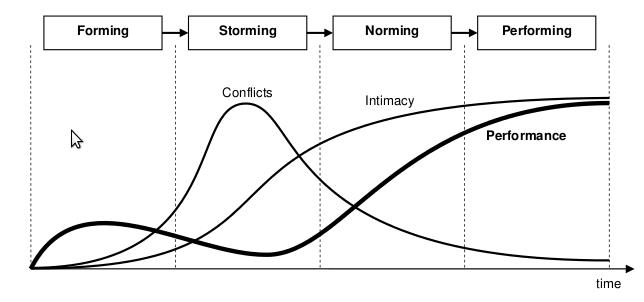2014/01/15
Four Stages in Developing a Project Team

Today, I would like to share with you about some useful facts in developing a project team that I noted when I read a PM book.
Four Stages in Developing a Project Team
The process of team development and team building seems very simple–bring appropriate
people from inside and/or outside the organization into the same team and get them to work
together in the most effective and efficient way possible. But it is not actually so easy to do.
It is widely recognized that a project team typically progresses through four stages of
development. These stages occur with any group of people who work together, and it
doesn’t matter whether the people know each other or not. It’s important for you as the
project manager to understand these stages so that you can help them progress to the most
effective stage of development. Below are the four stages of team development.

Stage One: Forming
The forming stage occurs when all the team members have been brought together and
introduced. Here they’ll be told about the project objectives, the tasks they’ve been assigned,
and the expectations the project manager has regarding the project and the team. At this
point team members are still not certain and are having many questions in mind such as the
followings.
- Why have I been assigned to this project?
- What is expected to me?
- What roles do the other team members have on this project?
- Will I be able to successfully complete the assignments given to me?
- Will I get the resources I need to perform the job satisfactorily?
- Can I work well with the project manager?
During this stage of team development people will be somewhat passive and cautious.
They’ll usually be polite and have a formal business approach communication style. But
teams usually pass through this stage rapidly and proceed to the next stage.
Stage Two: Storming
The storming stage is where the team starts to realize what the work of the project is. The
team members become more comfortable around one another and start doing and saying
actively to challenge one another for position and status within the team. Then the conflicts
start to occur. Team members start asking the following types of questions.
- Why is my assignment like this?
- Who is responsible for what?
- How will the work get completed?
- What process should we use to do the work?
Conflicts are not bad in this case; they are actually necessary to get the team into the next
stage. Team members need to recognize where they stand, how much their responsibility is,
and how they will accomplish their tasks by working with the other personalities of the team,
and that usually involves some collision.
Some teams have difficulty to go out of the storming stage. It’s difficult to manage a team in
this stage, and it could have a negative impact on the project if relations are particularly bad
among team members. Consider replacing team members who are not cooperating or are
the cause of unnecessary conflicts if the team doesn’t seem to be making any progress.
Stage Three: Norming
The norming stage is where the team starts to calm down, settle in, and do the work of the
project. Now they know what are expected to them, and they have accepted and understand
the goals of the project. The team members are comfortable with one another and with their
own positions within the team, and they will give positive influence with each other. Conflicts
decrease, and the team members confront the project concerns and problems instead of
one another. They make decisions jointly, getting input from all the team members.
As a project manager, you should continue to hold team meetings, especially during this
stage, because team members can go back into the storming stage if there is no appropriate
guidance from the project manager. Monitor each team member’s participation, and
encourage the team to continue to remain focused on the project’s goals and let them inform
you of any problems as soon as they arise.
Teams in the norming stage are efficient, functioning teams. If your team has progressed to
this stage, they will likely be productive and work effectively toward achieving the project
goals. But they still aren’t performing at their best, which happens in the next stage.
Stage Four: Performing
The performing stage is the most mature stage of all the development stages. The team
functions in the most productive and effective ways possible. They respect and support each
other, they monitor themselves, and they achieve great things in this stage. Teams that
operate in the performing stage are almost unstoppable. However, not all teams can
proceed to this stage.
The most effective teams perform at this stage. You cannot force this stage on the team.
There are some things you can do as the project manager to help the team progress to this
stage, though, including communicating effectively, asking team members for input, and
using effective conflict-resolution techniques.
Enjoy!!!
From:S-PM-A4-1.04-Team Management, Credit to original Author.
Author Profile

スターフィールド編集部
SHARE